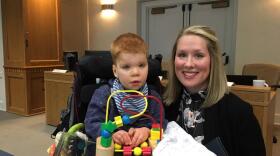-
As America’s population grows older, many communities may not be ready to meet the needs of seniors. What can individuals and local organizations do to prepare?
-
Mysterious bruises. An unreported burn. Two vulnerable clients left alone overnight. These are just some of the complaints that families are leveling against Aacres WA — a troubled residential care provider that gets tens of millions of dollars a year from the state to care for people with developmental disabilities. Now state officials say they’re investigating.
-
A former caregiver for people with developmental disabilities has been criminally charged in connection with the 2019 death of a client who ingested a large amount of household cleaning vinegar.
-
Early data show a 13.5 percent death rate among people with developmental disabilities who live in state-supported, community-based settings and have tested positive. That’s nearly triple Washington’s current statewide death rate of 4.6 percent. It’s a similar story in other states, including Oregon.
-
The Spokane County Medical Examiner determined Mary Wilson, a developmentally disabled woman, died from ingesting household vinegar. The cleaning strength product, with six percent acidity, had inflamed and killed the tissue in Wilson’s esophagus, stomach and small bowel resulting in her death. Her caregiver was supposed to give her prescribed liquid ahead of a colonoscopy.
-
The Medicaid fraud division of the Washington Attorney General’s office is conducting a criminal investigation into the death of a developmentally disabled woman who died last February in Spokane. The existence of the state’s investigation, which began in August, has not been previously reported.
-
Currently, nearly 14,000 people who meet the Washington state's criteria as developmentally disabled are not receiving services. They’re on what’s known as the no-paid services caseload.
-
For years, families of the developmentally disabled in Washington and their advocates have been frustrated that services in an institution, like one of the state’s Residential Habilitation Centers (RHCs), are an entitlement, but services in the community are not.
-
Fifty years ago, Owen might have been institutionalized because of his developmental disabilities. Today, his family just wants to take care of him at home. But they can’t get services from the state to help. And they’re not alone.
-
Not only are these patients being hospitalized unnecessarily, they’re taking up beds needed by other patients. As of Sept. 6, the state said there were 19 patients waiting for a bed at Western and Eastern State Hospitals.
Play Live Radio
Next Up:
0:00
0:00
Available On Air Stations









